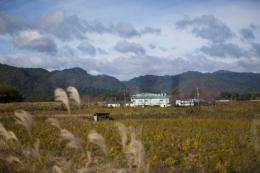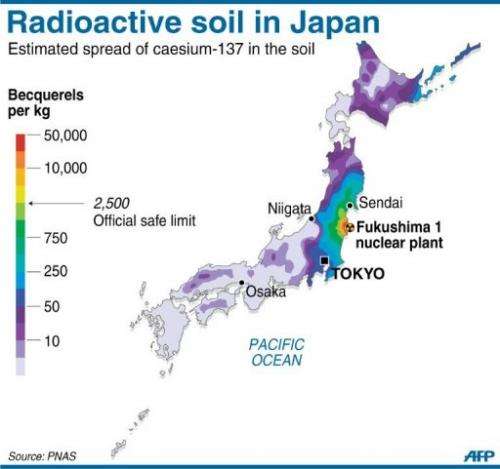Some land in Japan too radioactive to farm: study

Farmland in parts of Japan is no longer safe because of high levels of radiation in the soil, scientists have warned, as the country struggles to recover from the Fukushima atomic disaster.
A team of international researchers said food production would likely be "severely impaired" by the elevated levels of caesium found in soil samples across eastern Fukushima in the wake of meltdowns at the tsunami-hit plant.
The study, published in the Proceedings of the National Academy of Sciences journal, suggests farming in neighbouring areas may also suffer because of radiation, although levels discovered there were within legal limits.
"Fukushima prefecture as a whole is highly contaminated," especially to the northwest of the nuclear power plant, the researchers said.
The study looked at caesium-137, which has a half life of 30 years and therefore affects the environment for decades.
The legal limit for concentrations in soil where rice is grown of the sum of caesium-134 and caesium-137, which are always produced together, is 5,000 becquerels per kilogram (2.2 pounds) in Japan.

"The east Fukushima prefecture exceeded this limit and some neighbouring prefectures such as Miyagi, Tochigi and Ibaraki are partially close to the limit under our upper-bound estimate," the study said.
"Estimated and observed contaminations in the western parts of Japan were not as serious, even though some prefectures were likely affected to some extent," it added.
"Concentration in these areas are below 25 becquerels per kilogram, which is far below the threshold for farming. However, we strongly recommend each prefecture to quickly carry out some supplementary soil samplings at city levels to validate our estimates."
The study said "food production in eastern Fukushima prefecture is likely severely impaired by the caesium-137 loads of more than 2,500 becquerels per kilogram".
It is also likely production is "partially impacted in neighbouring provinces such as Iwate, Miyagi, Yamagata, Niigata, Tochigi, Ibaraki and Chiba where values of more than 250 becquerels per kilogram cannot be excluded", it said.
The study was led by Teppei Yasunari of the Universities Space Research Association in the US state of Maryland.
He and his team used daily observations in each Japanese prefecture and computer-simulated particle dispersion models based on weather patterns.
Japan has been on alert for the impact of radiation since an earthquake and resulting tsunami struck the northeast of the country on March 11, crippling the Fukushima Daiichi nuclear power plant.
Its cooling systems were knocked offline and reactors were sent into meltdown, resulting in the leaking of radiation into the air, oceans and food chain.
Shipments of a number of farm products from the affected regions were halted and even those that were not subject to official controls have found little favour with Japanese consumers wary of the potential health effects.
An official in charge of soil examination for the agriculture ministry said government tests had been conducted on soil in Fukushima and five other prefectures earlier this year.
He said contamination levels in Fukushima had exceeded 5,000 becquerels per kilogram, but were below that level elsewhere.
"We are now conducting further checks covering 3,000 spots in Tokyo and 14 prefectures and plan to publish the results later," he said.
(c) 2011 AFP

















